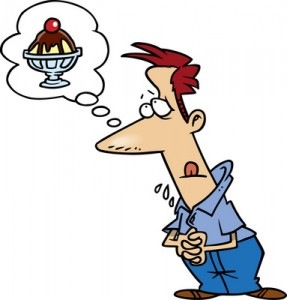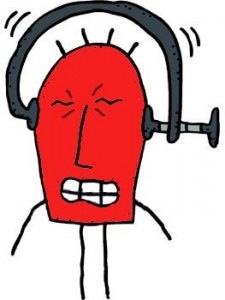 I guess one thing is for sure — you can get a sandwich — but I’m not quite certain whether it would be giant or tiny!
I guess one thing is for sure — you can get a sandwich — but I’m not quite certain whether it would be giant or tiny!
Eating on the Job
When Should I Eat?
 Hunger is a basic survival mechanism. It’s what signals our brains that our bodies need nourishment and energy — and it drives us to eat for fuel. We’re born with this ability – think about babies and how they cry when they need food – and how they stop eating when they’re full.
Hunger is a basic survival mechanism. It’s what signals our brains that our bodies need nourishment and energy — and it drives us to eat for fuel. We’re born with this ability – think about babies and how they cry when they need food – and how they stop eating when they’re full.
Those of us who struggle with our weight are sometimes disconnected from the signals that tell us when we’re hungry and when we’re full and satisfied. Some of us don’t even feel hungry because we eat so frequently that we never get to the point where our bodies knock on the door to let us know that they’re hungry.
The Hunger Scale
There is a hunger scale to help identify how hungry you are before, during and after eating. The scale goes from 1 to 10 with 1 being ravenous and 10 being so full that you feel sick.
The Scale:
- You’re ravenous and too hungry to give a hoot about what you eat
- You’re starving and absolutely must eat immediately because you’re irritable, cranky, and have no energy
- You’re hungry and the urge to eat is strong
- Your hunger pangs are signaling the first signs of hunger; you’re a little hungry
- You’re satisfied – not hungry but not full and you’re not aware of food in your stomach
- You’re fully satisfied and are aware of food in your stomach
- You’re very full, your stomach feels stretched, and you’re past the point of satisfaction but can still find room for more
- You’re uncomfortable because your stomach is too full and you really wish you hadn’t had those last few bites
- You’re stuffed, very uncomfortable, and your clothes feel very tight – that belt buckle or snap on your jeans doesn’t stand a chance
- You’re beyond full and feel sick, miserable, and you don’t want to move
What Number?
- If you’re at number 5 or above you’re not physically hungry and something else is triggering your eating.
- If you’re at number 4 you can wait to eat or eat a little bit.
- If you’re at a 2 or 3 it’s a good time to heat – have you noticed that food tastes pretty good when you’re hungry?
- If you’re at number 1 you need to eat — but pay attention to what you’re doing. When you’re starving you don’t care too much about what or how much you eat – and usually shovel food in as quickly as possible – which can result in overeating (pigging out) and ending up at a 7 and up.
- Gauge your hunger. If you’re only a little hungry, only eat a little. Preventive eating – or eating because you might be hungry in a little while – can cause you to pack in a lot of calories.
Can You Train And Tame Your Hunger?
 Physical – or real – hunger, the kind you feel when your stomach is growling, you’re irritable as all get-out, you’ve got zilch energy, and probably a throbbing headache, means you body needs food for fuel.
Physical – or real – hunger, the kind you feel when your stomach is growling, you’re irritable as all get-out, you’ve got zilch energy, and probably a throbbing headache, means you body needs food for fuel.
Info You Can Use About Hunger
- Hunger is somewhat unpredictable. Your actual hunger levels are not the same every day and can be affected by what your body needs and does — like activity, hormone levels, sickness, and other things.
- Hunger doesn’t necessarily follow a time schedule. You can adjust the types and amounts of your meals and snacks to influence the next time you will be hungry. Eating just because the hands of the clock are at noon or 6PM – even though you’re not hungry – can lead to weight gain and unhealthy eating habits.
- What you eat affects your hunger level. Carbs, fat, and protein are digested at different rates. Simple, refined carbs like soda and candy are digested rapidly. They give you quick energy from a surge in your blood sugar – which is followed by a rapid drop in your energy. Protein foods give you the most sustained blood sugar levels and satiety without the blood sugar spikes. Eating food that has a balance of nutrients is probably the best way to satisfy your hunger, keep you feeling fuller longer, and give your body the fuel it needs.
- How much you ate at your last meal affects you hunger levels since larger meals take longer to digest. Haven’t you ever eaten so much for dinner that you’re not hungry until lunch the next day?
- You can put off eating for a while –occasionally ignoring your hunger won’t cause a long-term or significant drop in your metabolism. If you do postpone your hunger the urge to eat will come back and may be stronger when it does return.
- Your stomach is about the size of your fist and can be filled by a palm full of food. Of course, since your stomach is a muscle, it can also stretch. When you stretch it out by putting in too much food you probably don’t feel so great (like overly stuffed at Thanksgiving). When you eat small meals you’ll get hungry more often and perhaps fuel your body more efficiently. This is the rationale for 5 or 6 small meals a day rather than two or three larger ones.
- Your body is smart. Have you noticed that sometimes you are hungry for a specific food? It might be your body’s way of letting you know that it needs a particular nutrient. Careful: sometimes that hunger is head or emotional hunger that popped up because you just passed a bakery and the smell of just-baked chocolate chip cookies is acting like a trigger!
- All kinds of foods can play a role in satisfying your hunger. Labeling food good or bad puts the food in charge. Depriving yourself of a particular food or attaching special meaning to it can set you up for cravings and overeating. It gives the food power over you rather than vice versa. Allowing yourself to make good choices from all foods; eating when you’re hungry; and eating portions that satisfy and not stuff you, put you, not the food, in charge.
Next post
When Should I Eat: a numbered scale to help you figure out how hungry you are and when to eat.
A Tasty Way To Lighten Up Your Burger
In my neck of the woods, barbecue season is right around the corner.
I happen to love hamburgers, but, needless to say, I don’t love the calories and saturated fat in most of them.
Some Hamburger Stats
Most (not all) hamburgers are made with either ground round or ground chuck and are usually six or more ounces.
A broiled burger made with ground round (85% lean meat) has 70 calories in each ounce with 4 grams of fat (2 grams saturated fat).
A broiled burger made with ground chuck (80% lean meat) has 76 calories in each ounce with 5 grams of fat (2 grams saturated).
How about substituting chopped vegetables for some of the meat? Onions, garlic, peppers, and mushrooms are some possibilities. An ounce of onions is 11 calories with no fat; an ounce of white mushrooms has 6 calories and no fat.
Switching out an ounce or two of meat for veggies can save you 60 to 150 or so calories and 4 to 10 grams of fat and add a whole bunch of flavor.
Try it – you might like it!
Head Hunger
 Have you ever followed an argument with a friend – or maybe with your Mom – with a trip to the bakery or the closest candy store?
Have you ever followed an argument with a friend – or maybe with your Mom – with a trip to the bakery or the closest candy store?
You could already be stuffed to the gills. But, all you can think about is getting that cookie, or candy bar, or bag of pretzels and chowing down – even though you’re not hungry and may or may not actually enjoy what you’re eating.
There’s Real Hunger And There’s Head Hunger
Real hunger or physiological hunger is your body’s way of telling you that it’s time to eat food for nourishment. It’s when you have that empty, rumbling feeling in your stomach, a headache, maybe some lightheadedness. It usually occurs two to four hours after your last meal.
Head hunger or psychological hunger doesn’t have physical symptoms and can happen at any time. It can be triggered by emotional situations, habits — like watching TV, working on the computer or driving in the car — or by food cravings or as a form of procrastination. Whatever triggers your head hunger can make you think you’re hungry when you’re really not.
Emotions: Common Triggers For Eating
Emotions are common triggers for eating. Head hunger is emotional eating usually in response to gremlins like stress, sadness, loneliness, anger, fear, or boredom.
Head hunger also serves as a distraction – the eating it provokes can be a way to distract yourself from difficult situations, projects, and encounters.
The thing is, these feelings and situations are a part of life and eating won’t make them go away. Eating in response to head hunger often keeps you from figuring out what’s causing the feeling in the first place.
“I want chocolate” might really mean “I need comfort” or “I worked my tail off and I really need to be recognized for it.” Those trips back and forth to the fridge or the vending machine might be the ultimate form of procrastination – is there a project that needs to get done that you’re struggling with?
What To Do
Wouldn’t it be great if it was as simple as figuring out what’s causing your head hunger and dealing with it. The fact is, that’s the answer. Eating can’t really satisfy your emotional needs, and left unmet, those needs will trigger your head hunger over and over. So, you overeat, you mentally beat yourself up, you feel awful, and the whole process is triggered once again.
To break the pattern, first stop beating yourself up when you eat in response to head hunger — as opposed to eating because you’re starving and your stomach is growling like crazy. Devise a plan to figure out what caused you to eat in the first place. Try keeping a written record of what happened and how you felt before your head hunger took charge. Looking back at a series of entries might give you a clue. Once you get a handle on your triggers, come up with a plan to deal with them and make a “go-to” list of ways to reward, calm, comfort, and/or distract yourself without eating.
